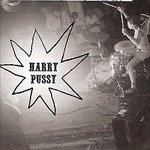When a unanimously lauded band lives in relative obscurity for much of their existence, a greater feeling of curiosity overtakes their fans, a constant desire to dig up every bit of information about this strange entity until the pieces begin to shape a context or an identity. This band, for me, has been Harry Pussy.
The band once relied more heavily on the ‘noise’ aspect of the ‘noise-rock’ label, an inadequate descriptor that they gleefully tore apart, even before the internet and events like No Fun Fest increased the exposure and appreciation for these sorts of acts. Harry Pussy, despite now being one of the most agreed-upon bands among those into abrasive avant music, were, for their time, one in a million, existing as a contentious and underappreciated behemoth, either stunning or (most likely) terrifying those who encountered their frantic and caustic chaos. They kept it up for a good five years before calling it a day in 1997, and despite a Siltbreeze retrospective of their early years (What Was Music?) and a baffling and criminally underrated full-length (Ride A Dove), most of Harry Pussy’s output — mainly the pummeling output of their final year, which die-hards insist was their strongest material — has been impossible to obtain, leaving these cult legends to remain that much more enigmatic.
After years of name-dropping, friend-of-a-friend tales of mind-blowing live shows, and rumors of shaky relationships that tore the band apart, the final days of Harry Pussy have been mercifully collected on You’ll Never Play This Town Again, a daunting and essential document that offers a few more clues about the band’s storied existence. A difficult retrospective not just in sonics, it is comprehensive to the point of being ludicrous to newcomers. The amount of overlap is indeed almost laughable; their self-released untitled LP (a.k.a. Fuck You) begins this collection, and it alone gathers the near-entirety of their 1997 setlist, rendering the blistering blasts of beyond-damaged noise-rock with a warm sheen of no-fidelity, sounding like the kind of forgotten avant-punk obscurity the band seemed to be so enamored with. It adequately showcases what made this band and their brilliant, dizzying tantrums worthy of such adoration.
Forgoing some of the more labored and improv-focused jams that characterized their earliest work, the Harry Pussy heard here lets drummer Adris Hoyos amp up her deliriously anarchic pounding while her unreal, piercing shrieks become just as powerful and distinguished an instrument. Bill Orcutt and Dan Hosker, the trio’s two guitarists, are equally unruly; playing off of each other like a deranged no-wave/avant-jazz crossover played five speeds to fast, they nevertheless lock into their complicated patterns with the utmost logic. Even the most skittish listener can't accuse Harry Pussy of being sloppy — lawless, sure, but there’s an obvious logic to the band’s spastic violence, only threatening to fall apart. Songs like "Sex Problem" and "Ice Cream Man" play like a swift punch to the gut, a bizarre and fascinating series of tiny beasts that sound like a free-jazz band playing hardcore punk covers as seen through the eyes of a grindcore act. Interestingly, this early hardcore influence is shown explicitly with their cover of The Nip Divers’ "New Song," proving that this band was just as exceptional when playing things comparatively straight.
After the few strange outtakes that follow the untitled LP — most notably the synth-inflicted "Velvet Pussy" and "MS20" — we get, quite literally, more of the same. One of the band’s final live sets is presented with blindsiding clarity on what is perhaps the holy grail of Harry Pussy treasures, the Cherry Smash 10-inch, which contains the vast majority of the untitled LP, recreated nearly verbatim in a live setting. While the band rather humorously plays a few of the set’s songs more than once (perhaps a winking nod to what can superficially be seen as the "sameness" of their material), this unending barrage of viciousness renders such quibbles and head-scratching moot. In fact, the blink-and-miss-it length of their songs makes their subsequent regurgitation across this disc almost welcome, a strange encore of sorts that simultaneously assaults and satisfies. Also welcome is the band’s rather absurdist and witty stage banter, emphasizing the refreshing unpretentiousness and snarky sense of humor that held out through much of their career; Harry Pussy seemed to represent a reaction against noise’s self-serious streak, as well as the tempered banality that would displace much of the erosiveness and excitement from ‘indie rock’ in the ensuing years.
On Live At Salon Zwerge, the band blasts one of their more curious pieces, “Mandolin,” into a full-on, 18-minute assault of bleakly serene textural near-drone. On Untitled and Cherry Smash, this song was already a head-spinning secret weapon, a slowly-building epic of clanging guitars and subtle percussive build-up that felt disarmingly ambient until the rug was pulled out from underneath it and it seemed simply to fall apart. On Salon Zwerge, however, it is almost unending, becoming a layered monstrosity of avant-garde exploration that drifts far apart from the speed frenzy of the group’s usual sound, bewildering all expectations with something strangely arduous and hypnotically unsettling — indeed, the recording cuts off before the song even has a chance to truly finish.
To further beat their songs into your skull, the collection ends with additional studio sessions of all this same material, recorded by To Live And Shave In L.A. mastermind Tom Smith and exhibiting an almost ironic polish that does nothing to temper the sheer ugliness and intensity of the material. These pieces were previously spread across various 7-inches, including splits with seemingly forgotten skronkers Frosty and near polar opposites Pelt.
You’ll Never Play This Town Again is an exhaustingly comprehensive document of some of Harry Pussy’s greatest accomplishments. Given its repetitive nature, even the most enthusiastic fans may have difficulty absorbing all this material in one sitting. Nevertheless, it’s unquestionably a must-have, whether for the long-time fans who’ve had trouble acquiring all these recordings over the years or for those who’ve only passingly been exposed to the group’s work. Even in today’s suddenly overcrowded and overexposed ‘noise’ scenes, these 11-year-old recordings sound just as visceral, shocking, and frightening as they no doubt did to audiences way back when there was little precedent for this bedlam.
More about: Harry Pussy



